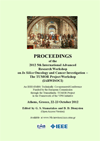
Treatment optimization is to be achieved through experimentation in silico i.e. on the computer. Moreover, provision of insight into tumour dynamics and optimization of clinical trial design and interpretation constitute short- and mid-term goals of this new domain. Researchers working either in the area of in silico oncology or in the broader cancer research domain yet with an interest in computational oncology are invited to submit short papers.
The workshop was an excellent opportunity for both shaping and advancing the discipline.
Download: Proceedings of the 5th International Advanced Research Workshop on In Silico Oncology and Cancer Investigation (.pdf, 5.417 KB).
Download from eHealthNews.eu Portal's mirror: Proceedings of the 5th International Advanced Research Workshop on In Silico Oncology and Cancer Investigation (.pdf, 5.417 KB).
Related news article: